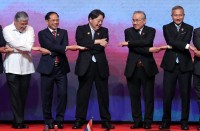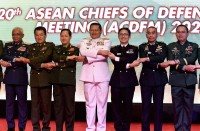BEIJING, China (AFP) — Beijing rapped Washington Tuesday for its interventions in Asia, as tensions grow between the two powers over territorial disputes in the South China Sea and how to handle increasingly erratic North Korea.
Speaking at the 7th annual Xiangshan regional defence forum in Beijing, Chang Wanguan, China’s defence minister, levied thinly veiled criticism at recent US involvement in Asia’s trouble spots.
Washington has conducted freedom of navigation operations close to artificial islands Beijing has built in the South China Sea, and has agreed to deploy a missile defence system in South Korea following repeated nuclear and missile tests by Beijing’s ally Pyongyang.
“Some countries seek absolute military superiority, ceaselessly strengthen their military alliances, and seek their own absolute security at the costs of other countries’ security,” Chang told defence officials and academics at the meeting.
The US under President Barack Obama has sought to “pivot” to Asia by increasing military and economic engagement in the region, raising concerns in Beijing that Washington is working to contain the Asian giant’s growing power.
Tuesday’s meeting — themed on “building a new type of international relations” — followed a year of growing tension in the region, primarily centred on Beijing’s actions in the strategically vital South China Sea, where it has built islands capable of supporting military facilities.
China says it has rights to almost the entire region, while Brunei, Malaysia, the Philippines and Vietnam, and Taiwan all have rival claims.
In July, an international tribunal said that almost all of Beijing’s claims have no legal basis, a decision China attacked as biased and vowed to ignore.
Washington argues that Beijing’s moves pose a challenge to freedom of navigation and has sought to challenge Beijing’s claims by dispatching military ships and aircraft to the area.
Addressing the forum, former Australian Prime Minister Robert Hawke warned that the disputes, if not properly managed, could become “a flashpoint for US-China conflict”.
“These disputes have the potential to disrupt the entire regional order,” he said.
China has also raised concerns over Washington and Seoul’s decision this summer to install a THAAD missile defence system in South Korea in response to growing worries about its northern neighbour’s nuclear programme.
Beijing, Pyongyang’s sole ally and largest trade partner, claims the move will destabilise regional security, a position that is supported by Moscow.
Speaking on a panel during the forum, Russian deputy defence minister Anatoly Antonov slammed the agreement.
“We are concerned about the attempts of certain nations to exploit the complex situation in the Korean peninsula,” he said, “pumping this sub-region with clearly excessive defence capabilities.”
The decision has “aggravated regional tension” and “adds problems to solving the situation.”
North Korea conducted its fifth nuclear test last month, drawing international censure and a push to put further sanctions on the isolated country.
© 1994-2016 Agence France-Presse








